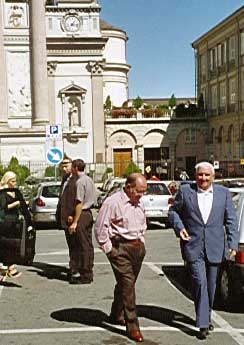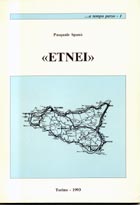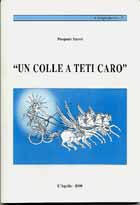 |  The cards, the people, the memory ... |
| Pasquale Spanò | Bronte's personalities |  |
| You are in: Home–› Personalities–› P. Spanò
|
He has always lived with the memory of his native country Pasquale Spanò Poet and historian Pasquale Spanò was born in Bronte on July 19th, 1918. Essayist and poet, he spent his years out of Bronte, teaching in Italy and abroad, but remained always bound affectively to his native town, to which he also dedicated a great deal of poetries and historical studies. He performs the studies at the Salesians Of Pedara and subsequently at the Capizzi Gymnasium Secondary school In Bronte. Graduated in Letters at the University Of Messina, he has taught first in Chieti, then Frosinone and also L'Aquila. Having graduated also in Languages, he takes part, in the second world war, as a cavalry officer; in 1943, (after the 8th of September), at 35 years of age, finds himself, "in the most unforeseeable way", in Switzerland. After the crumbling of the Italian army, he takes refuge, in fact, in Val d'Ossola, where, trying to run as far as possible from Germans, he trespasses on Swiss territory, it is captured by the Swiss guards and is interned for twenty-two months. The ideal of "democratic freedom" and "federalism" that Switzerland was presenting in that tragic period, charms Pasquale Spanò: ("...was spontaneous to compare Europe torn to pieces by a war without sense, with the peace which had been able to gain that people formed by little pieces of the same nations in struggle"). In Switzerland, also found cordiality, affection and the possibility of inserting himself in the social context and the help and the guide in his studies; and here also continues his teaching profession.
Got back to Italy, he concluded his teaching activity as headmaster of a Secondary school In Torino, where, in pension at present, lives (in Nichelino) and where attending the schools of the Valdocco Salesians, could graduate In Theology. Pasquale Spanò, lives in the memory of his native country and from poet and historian, dedicated a few works of his to it. |
|  | The brontese Pasquale Spanò, poet and essayist, in a recent photograph, done in front of the complex of the Valdocco Salesians, together with his grandson Giuseppe Longhitano, known brontese criminal lawyer. |
|
|  Three the books of poetries that he defines as "pseudo-poetical oddities", we remember: Three the books of poetries that he defines as "pseudo-poetical oddities", we remember:
 “Etnei” (Torino, 1993), a collection of poems written in forty years (from 1939 to 1979) "of emotions caused from the periodic returns of the author to Bronte and the following departures, in autumn, to the reopening of the schools". “Etnei” (Torino, 1993), a collection of poems written in forty years (from 1939 to 1979) "of emotions caused from the periodic returns of the author to Bronte and the following departures, in autumn, to the reopening of the schools".
The book, a "fanciful rebuilding of the origin and transformation of Bronte and his people", ripened with the age of the author, would like to present the Brontese folks as a universal model of all humanity in the perennial torment of research". One poetry of his "Stirpe divina" (Divine stock) tells the fanciful origin of the foundation of Bronte as work by the Cyclops "human and laborious" and of three nymphs, Scibìlia, Salìcia and Rivòlia.  “Prigionieri dell’impossibile” (Prisoners of the impossible) (L'Aquila, 1998), another collection of poetries written in Italy during the war period (1939-42), in the "internment fields" in Switzerland (1943-44), during the long return journey in Sicily (1944-45) and in next journeys in the Swiss nation. “Prigionieri dell’impossibile” (Prisoners of the impossible) (L'Aquila, 1998), another collection of poetries written in Italy during the war period (1939-42), in the "internment fields" in Switzerland (1943-44), during the long return journey in Sicily (1944-45) and in next journeys in the Swiss nation.
  “Un colle a Teti caro” (A hill dear to Teti) (L'Aquila, 2000) fifty years of poetries (from 1947 to year 2000), made of memories, of touching personalities and, above all dedicated to Millya, the soul mate ("light butterfly"), with whom Pasquale Spanò ("noisy bumble-bee") spent "a long fifty year old idyll with never a disagreement, a tear, a pain". “Un colle a Teti caro” (A hill dear to Teti) (L'Aquila, 2000) fifty years of poetries (from 1947 to year 2000), made of memories, of touching personalities and, above all dedicated to Millya, the soul mate ("light butterfly"), with whom Pasquale Spanò ("noisy bumble-bee") spent "a long fifty year old idyll with never a disagreement, a tear, a pain".
Among the books of historical rebuilding that Pasquale Spanò defines "particular studies", we mention:  “C’era qui una volta il Rizzonito (Bronte nella storia d’Europa)” ("There was here once the Rizzonito (Bronte in the history of Europe)”, (Torino, 1993), dedicated "to the boys of Bronte so that they do not forget", the book exposes the tormented development of the historical events of the Etna' town, offering a picture chronological, concise but complete and historically valid, of the development of events. “C’era qui una volta il Rizzonito (Bronte nella storia d’Europa)” ("There was here once the Rizzonito (Bronte in the history of Europe)”, (Torino, 1993), dedicated "to the boys of Bronte so that they do not forget", the book exposes the tormented development of the historical events of the Etna' town, offering a picture chronological, concise but complete and historically valid, of the development of events.
 “Uniti nella diversità (La Svizzera vista da un Italiano)” (“United in the diversity - Switzerland seen by an Italian)” (L'Aquila, 1998), where the author, who evidently found in Switzerland a second country, exposes the birth and the social evolution of the Swiss confederation describing "the spirit of pacific cohabitation, which is to the base of a state formed by various peoples for stock, tongue and religion". “Uniti nella diversità (La Svizzera vista da un Italiano)” (“United in the diversity - Switzerland seen by an Italian)” (L'Aquila, 1998), where the author, who evidently found in Switzerland a second country, exposes the birth and the social evolution of the Swiss confederation describing "the spirit of pacific cohabitation, which is to the base of a state formed by various peoples for stock, tongue and religion".
|
 Translated by Sam Di Bella Translated by Sam Di Bella
|  
|  Powered by Associazione Bronte Insieme / Reproduction not permitted even if partial Powered by Associazione Bronte Insieme / Reproduction not permitted even if partial

| |
|